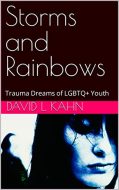Dreamwork so often leads to trauma work, both our own and of others. Mass trauma is much the same, with common themes appearing in the dreams of those who have suffered through the worst cruelties of humanity. I saw many repeated patterns when studying and reporting on the dreams of genocide survivors, and I found the same to be true when reading through dozens of dreams of LGBTQ+ youth.
As a father of transgender twins, my experiences and understanding of the challenges these young people face is deeply personal. I also ended up in a unique situation to listen, learn, and advise due to my kids having a significant social media following, of which a large percentage are young people in the LGBTQ+ community.
For this research study, I conducted two surveys in which the respondents anonymously provided information including their age, the gender they identify with (if any), the extent to which they have come out, acceptance or disapproval of family, how much bullying they have experienced, and the degree of dysphoria they feel. They also provided dream examples, from which there were several common themes that often matched with specific life circumstances.
The traumatic experiences most often reported, and to which repeated dream symbolism resulted, include:
- unsupportive families,
- a mixture of supportive and unsupportive family members that caused family drama or division,
- fear of coming out,
- religion and politics,
- dysphoria and other body image issues, and
- bullying.
The most common dream themes of those who reported these life situations include:
- drowning or being trapped,
- family and friends laughing or pointing,
- being called by their birth names and genders,
- being in the wrong body,
- being injured or threats of harm,
- not being spoken to, and
- family and friends acting disgusted or disowning them.
Examples for this article focus on bullying. School is an especially difficult place for many LGBTQ+ youth. They experience bullying at a highly disproportionate level compared to other students, and in some cases, they do not feel that the adults in the school do enough to protect them.
Here is an example of a bullying dream:
I was drowning, but not in water. It started at school and as I went deeper, I fell into my house, then into my therapist’s office, and then to the park where I was beaten up for “acting like a dyke.” I then fell into a car that crashed, which turned into words like “tranny” “she-he” and “fag.” I woke up hysterically crying, but my unsupportive mother told me to get over it and that it wasn’t that bad.
This dream includes the frequently reported themes of drowning, violence, and name calling. The drowning dreams were common among respondents who did not feel like they had any control of their circumstances, which nearly always coincided with a lack of support at home. That leads to the next disturbing place where these kids experience bullying, which is in their own homes. These home experiences range from insensitive jokes to physical abuse. Feeling unsafe both at home and at school too often results in depression, drug and alcohol usage, self-harm, and suicide attempts. The lopsided rate of these calls for help shouldn’t be a surprise to anyone, given the daily harassment, and sometimes violence, suffered by these young people.
Another dreamer had this experience:
I dreamed that my dad busted in the front door. He yelled at me saying stuff like that he should “beat the gay” out of me…This may have been fueled by my dad saying he should beat me for being gay.
The internet provides many places for LGBTQ+ people to be themselves, whether they can be at home or not. That sense of community is important, and for some, lifesaving. However, online harassment continues to be a concerning problem. Online bullying happens both from the students at the same school, as well as from random strangers. The language is often especially harsh as it is easy to hide behind fake personas. It is also easier for people to detach themselves from the harm they cause and to avoid consequences when there is no direct personal confrontation.
Religion leads to some of the most difficult bullying problems to overcome because it often comes with the justification of long-held beliefs, and in some cases, self-righteousness. When a group of people believe that another group is bad, committing a sin, or less deserving of equal rights, atrocities have historically followed.
I saw that pattern repeatedly when studying genocide dreams. In Nazi Germany, the slaughter of Jews was justified by those in power and ordinary citizens. In the United States, the dual genocides against Native Americans and African slaves were legal for much of the country’s history. The worst brutalities of history were nearly all a result of one group of people feeling superior to another. The persecution of the LGBTQ+ community has followed this same pattern of justification by means of moral superiority, taught by religious leaders, and passed down through generations.
Here’s a respondent’s dream with a religious theme:
My dream was about the day I would finally come out to my parents after hiding it for so long. I tried to come out once and was threatened to be sent to Catholic school. I’m still currently hiding my sexuality in fear I will be sent away. In the dream I came out to my parents, and they told me they wanted nothing to do with me.
Equality is never guaranteed, and in fact it has been consistently on political ballots. Whether it is due to religious beliefs or political gain, votes are often cast based on who is given equal rights, and who is not. The recent onslaught of anti-LGBTQ+ bills is alarming. Freedom is a given for some people, and for others it requires a constant fight. It isn’t so much the beliefs of some people that is the major problem. It is when those beliefs are forced upon others and made into laws that it becomes inhumane.
The constant threat of rights being taken away no doubt adds significant anxiety to people who already have little reason to feel welcome and accepted in public.
These themes can also be seen in my personal dream journal:
I am with a group of people in a building looking out through windows to a connected brick building area that I think of as a jail. A young lady loudly yells out vulgar gay slurs. It is offensive and I’m embarrassed by her behavior, though I sense that this girl doesn’t fully get it. I feel like I should say something, but I don’t. We all just ignore it. I then see a couple of guys across from me talking, and one joins in making gay jokes. Now I realize that several people here are joining into this nastiness. I see people I know sitting there, not saying anything. No one is speaking out. I’m not saying anything because I’m afraid of being the only one who does, but my thinking begins to shift, and I now feel like I need to. This isn’t funny at all. The dream ends with me knowing that the gay people being joked about are the prisoners in the connected building.
Some positive dreams were also reported, most of which were about supportive family and friends, and of surgery or other forms of physical transition. The positive dreams were, as expected, reported most by those with supportive families.
Those who reached or were nearing adulthood also reported more positive dreams, which I believe connects with their ability to make more decisions for themselves, along with having more access to support of others in the community.
 Where dreams are concerned, some go beyond the individual dreamer. There is a communal space where we are sometimes called for a larger purpose. My work with trauma dreams has come from that space.
Where dreams are concerned, some go beyond the individual dreamer. There is a communal space where we are sometimes called for a larger purpose. My work with trauma dreams has come from that space.
As dreamers, we inevitably learn that there is no difference between the healing work of others and the healing work of ourselves.
This article is adapted from David L. Kahn’s new book Storms and Rainbows: Trauma Dreams of LGBTQ+ Youth
About the Author
 David L. Kahn is the author of Storms and Rainbows: Trauma Dreams of LGBTQ+ Youth. His dreamwork includes presentations, articles, and a contribution to the Encyclopedia of Sleep and Dreams on the dreams of Holocaust and Rwandan genocide survivors.
David L. Kahn is the author of Storms and Rainbows: Trauma Dreams of LGBTQ+ Youth. His dreamwork includes presentations, articles, and a contribution to the Encyclopedia of Sleep and Dreams on the dreams of Holocaust and Rwandan genocide survivors.
David is also an avid lucid dreamer and frequent contributor to Lucid Dream Experience magazine. His website is www.BoundlessDreaming.com